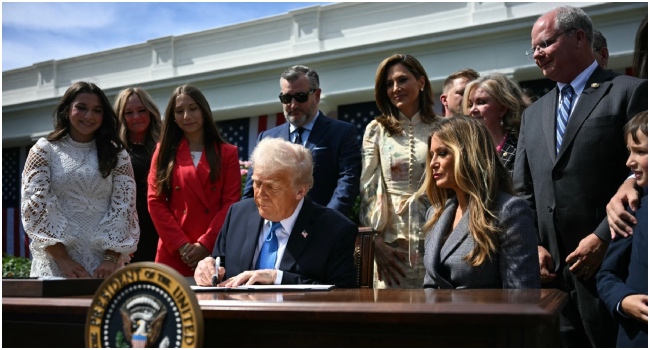
In a landmark move to combat digital harassment and protect personal privacy, U.S. President Donald Trump on Monday signed into law the Take It Down Act, which makes it a federal crime to publish or distribute non-consensual intimate images — including those generated using artificial intelligence.
The legislation, passed with broad bipartisan support in Congress, criminalizes the intentional posting of explicit images without the subject’s consent and mandates their prompt removal from online platforms. Offenders could face up to three years in prison under the new law, while platforms that fail to act within 48 hours of notification could be held liable in civil court.
Speaking at the signing ceremony in the Rose Garden, President Trump underscored the urgency of the issue in the digital age.
“With the rise of AI image generation, countless women have been harassed with deepfakes and other explicit images distributed against their will,” Trump said. “Today, we are putting an end to that abuse. It is now totally illegal.”
The legislation addresses not only traditional forms of “revenge porn” — intimate content shared maliciously by ex-partners — but also deepfakes, hyper-realistic fake images or videos often created using AI tools. These falsified visuals have increasingly targeted women, including public figures, minors, and private citizens, many of whom have little recourse when such content goes viral online.
Melania Trump: “A National Victory”
First Lady Melania Trump, who has been a vocal advocate for online safety and anti-cyberbullying initiatives, played a key role in endorsing the bill. In a rare public appearance at the White House, she described the law as “a national victory that will help parents and families protect children from online exploitation.”
“This legislation is a powerful step forward in our efforts to ensure that every American, especially young people, can feel better protected from their image or identity being abused,” she said.
Since taking office, Melania Trump has maintained a relatively low public profile, but her presence at Monday’s event signaled her commitment to safeguarding families from the growing dangers of digital abuse.
Addressing a Rising Threat
While some states, including California and Florida, already have laws criminalizing sexually explicit deepfakes, the Take It Down Act represents the first federal legislation of its kind. It arrives at a time when the use of AI-powered tools to create non-consensual content is outpacing global regulatory frameworks.
In recent months, incidents have been reported across U.S. high schools involving AI-generated pornographic images targeting teenage girls. The impact of such abuse — ranging from harassment and bullying to extortion — has been devastating, prompting calls for swift legal intervention.
“This is a very important first step,” said Dorota Mani, a mother of a teenage victim, speaking to AFP. “Now I have a legal weapon in my hand, which nobody can say no to.”
Critics Caution Against Overreach
Despite the broad support, the law is not without its critics. Civil liberties groups, including the Electronic Frontier Foundation (EFF), have voiced concerns that the act could be misused to suppress lawful speech.
“The bill gives the powerful a dangerous new route to manipulate platforms into removing content they simply don’t like,” the EFF stated, warning that it could grant authorities excessive censorship power without due process.
However, experts say the legislation addresses a gap in existing law and signals that the government is serious about curbing digital abuse.
“This bill is a significant step in tackling the exploitation of AI-generated deepfakes and non-consensual imagery,” said Renee Cummings, an AI ethicist and criminologist at the University of Virginia. “Its success will hinge on enforcement, strong penalties for offenders, and the ability to adapt quickly to evolving digital threats.”
A New Era of Online Accountability
The Take It Down Act sets a precedent for how governments might regulate the intersection of technology, privacy, and consent. It requires online platforms to establish clear procedures for victims to report harmful content and compels those platforms to act swiftly.
For victims of image-based abuse — whether rooted in personal betrayal or technological manipulation — the new law offers long-overdue recourse and a path toward justice.
